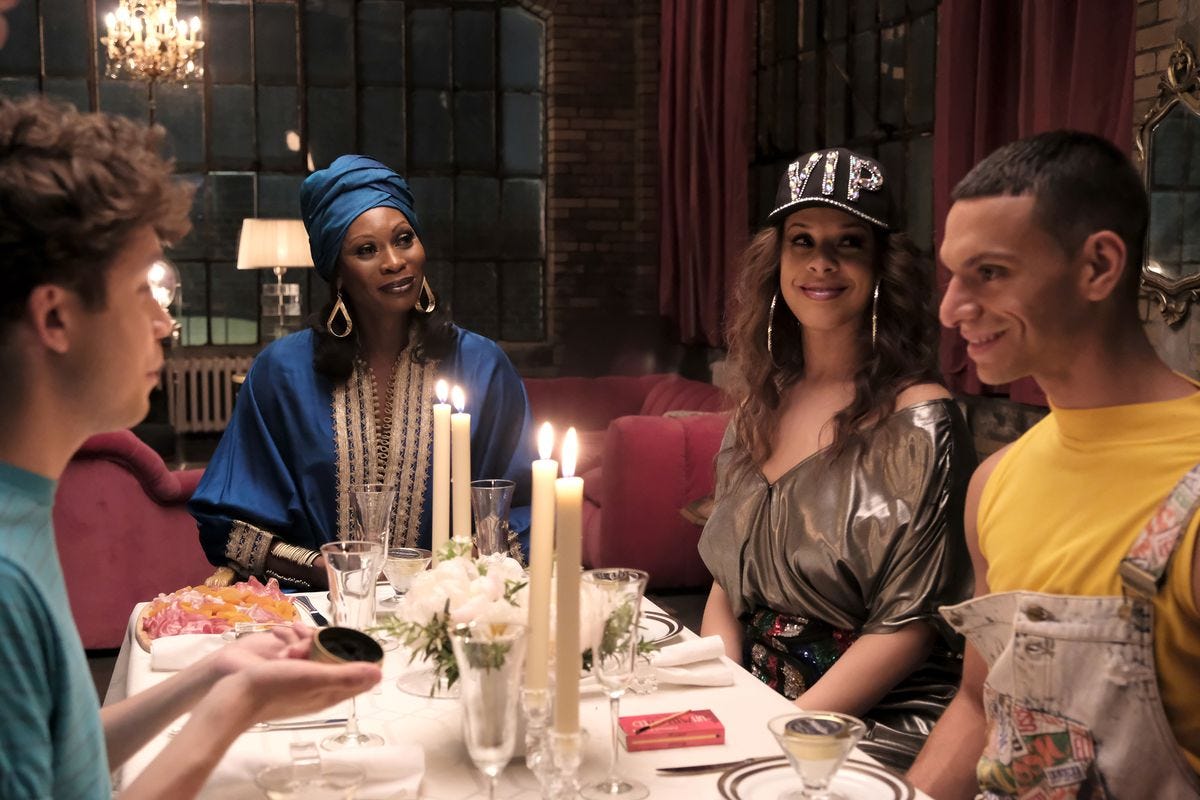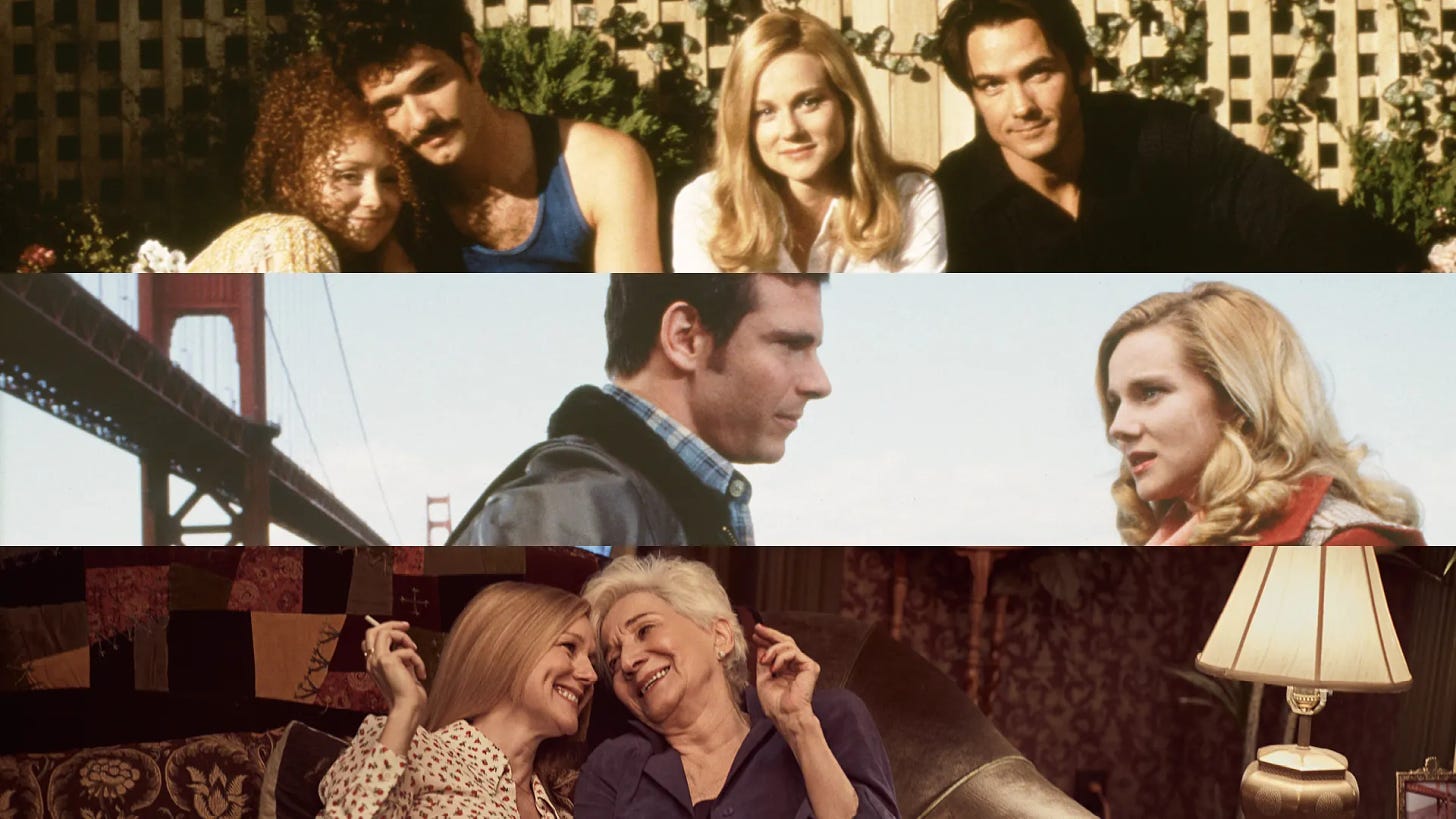What Is a Chosen Family? An Open Thread
Let’s share our experiences of friends and loved ones who we value outside romantic relationships.

I don’t recall the first time I heard the term “chosen family,” but I remember when it stuck out as a fact of my life. It happened some time in 2017—much later than you might expect since I’d been exploring queer theory and culture for decades by that point. I was watching The Untold Tales of Armistead Maupin, a documentary about the San Francisco-based author of the Tales of the City books, that was a companion to his memoir, Logical Family. As Maupin states in the book’s prologue:
“Some children…grow up another species entirely, lone gazelles lost among the buffalo herd of our closest kin. Sooner or later though, no matter where in the world we live, we must join the diaspora, venturing beyond our biological family to find our logical one, the one that actually makes sense for us. We have to, if we are to live without squandering our lives.”
Perhaps it’s a romantic notion I gleaned from reading Armistead Maupin’s books in high school. A friend’s father had the first five, an heirloom from his own brother who died from AIDS, and he leant them to me while I was living in Valdosta, Georgia. Around the same time, the American Playhouse series premiered on PBS in 1994—with all the attendant controversy of the culture wars stoked by Newt Gingrich and others—and I fell for naive straight woman Mary Ann Singleton (played by Laura Linney), bisexual Mona, lovable gay man Michael “Mouse” Tolliver (who kept poppers in his fridge, which was also news to me), and the matriarch Mrs. Anna Madrigal (who has her own backstory that I won't spoil for anyone who still hasn't dipped into this series). The bunch of curious oddballs living together under one roof while exploring their sexualities and looking for love became an ideal. (Sadly, I didn’t love the Netflix reboot, since it tried to be soooo inclusive it lost most of the charm of the original.)
Apparently it hasn’t lost its appeal for younger generations. As Alim Kheraj, a gay man much younger than me, shared in a post about the books:
“More than anything though the books, with their bounty of LGBTQ characters and their allies, made me realize how much I needed my own version of 28 Barbary, less a building than a family. With Barbary Lane, Mrs. Madrigal created security for her tenants: they became her children and each other’s confidantes. I craved that. I had friends, but very few were queer, and no matter how close you are to your straight loved ones, being LGBTQ others you. Reading Tales of the City left me bereft for something I’d never had. What I was missing were my people.”
This sentiment is one of the reasons I included a question about whether people have a Chosen Family in our QLP Questionnaire. Perhaps people will be surprised to have that pop up, but I believe that queer love thrives on friendships and is just as vital as erotic and romantic and familial love.
It’s something that I’ve been pondering recently as I’ve been traveling with my husband for the past few weeks in Brazil. While in Salvador de Bahia, I met up with two expats who have been living here for decades. Both Black gay Americans who retired from their jobs in the United States, they’ve carved out a happy life here in this gorgeous city. In separate conversations, both Harold and Carson told me about the power of friendship, the bonds that gay men create to keep us sustained. As I explained some of the sticky moments some of my close friends have had over the years—and how I attempted to help and support them—Carson, who had just lovingly clocked me as a “fellow trollop,” stopped me mid-ramble.
“That’s friendship, my dear,” Carson said in his dramatic fashion that has tinges of James Baldwin profundity in its timbre. “You are a friend.”
It sounds simple, but his statement stuck with me. My friends are immensely important to me. I depend on them, and I do think of them as my Chosen Family.
I also finished Blessings by Chukwuebuka Ibeh this past week. It’s a gay coming-of-age novel set in Nigeria in the 2010s and, after many harrowing descriptions of assault in an all-boys boarding school, coupled with tumultuous nuclear family abuse, it culminates when the Same-Sex Marriage Prohibition Act of 2014 terrorizes a community. The final moments portray how a Chosen Family in Nigeria is splintered by fear and betrayal, as some flee to foreign countries to seek asylum.
Some of the reviews I read seemed to think this story was a bit cliche with so much progress that’s been made. It’s true that we do have decades of literature that details similar traumas and tragedies from the lens of (mainly) white, male perspectives. That doesn’t mean we should stop reminding people that these stories persist. Many younger people may take for granted the relative ease of living a freely queer life now. With same-sex marriage legalized in many places around the globe, and the potential for queer families to flourish, one can forget what it looks like to live, love, struggle, and age together without traditional family ties.
At times, it may seem that gay men, in particular, have a difficult time forging those bonds since there’s unresolved sexual tension between friends (which I’ve written about before) or competition to find a mate. I often laugh when a straight woman at a dinner party naively asks how two gay men know each other. “How did you two meet?” usually involves details that aren’t always appropriate for “polite conversation” and straight people don’t always comprehend that someone you gave a blow job to a decade ago, or were fuckbuddies for a time, can convert into a lifelong friend and trusted confidante. Of course, these themes were also explored in other series, such as Queer as Folk, Looking and the granddaddy of them all: Boys in the Band.
From what my lesbian and trans friends have described—and which was dramatically explored in both versions of the The L Word TV series—it’s similar for many others. It’s also the backbone of the groundbreaking series Pose, which centers the story on BIPOC and trans characters. Yet Chosen Family or Logical Family or whatever type of bond you may have created with those who are not your biological fam are often where we learn how to build our identity. Rarely do queer people have queer-identified parents to teach them, and we often go searching for mentors and guides (and it’s a theme we’ve seen repeated in essays and responses, and what many glibly call “daddy/mommy issues” as shorthand).
For me, I know I had to reject my own biological family for many years so I could follow my own path. I find the ideology of “family is the most important thing” can too easily become toxic (something I touched on in my essay for Open Secrets last year). While watching the latest controversial Ryan Murphy limited series, Monsters, the idea of the nuclear family being a vortex of pain and grief triggered more thoughts on why Chosen Family can be preferable to the one we’re born into.
It’s only fairly recently that I’ve felt comfortable figuring out how to be myself with members of my family. After years of talk therapy, I have a wonderful relationship with my younger brother and have started to figure out how to trust others who I’m related to “by blood.” The tyranny of the nuclear family still overpowers so much discourse, and it causes many to devalue those friend bonds that can nurture and support in ways that a mother, father, brother and sister that you didn’t choose may never be able to.
So I’m curious how others define a Chosen Family. Feel free to tell us the experiences you treasure. But don’t skimp on the sore points either. I know it’s not all rainbows and glitter. Members of our Chosen Family and friends can disappoint us and betray us—just like our biological ones. So let’s continue to discover why the individuals we find and cherish and trust matter to us.






This was very interesting, Jerry - and I enjoyed your Medium post too. Interesting you mentioned Tales of the City, we've go a post coming this month with Nan Tepper's discussion of it for The Books We ❤️ Club. :)